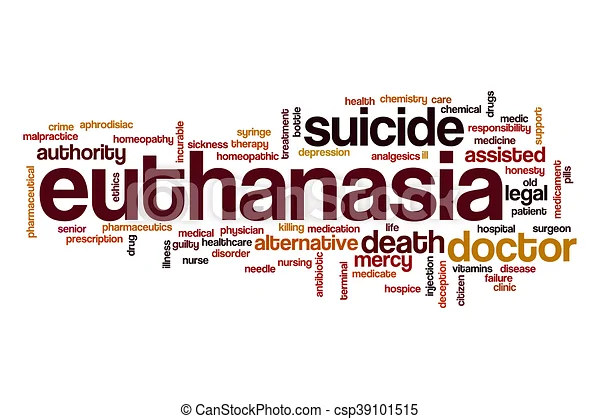This word is remote to many, sounds like something that is known but not really encountered in common use, for many people the word conveys an idea of something that is not really done but they are wrong, Euthanasia is a process already being accessed by many. There are people that see it as their best option to approach life’s exit door. This word does not describe a service, nor does it convey a practice that is agreed to by many but once a thing is fully debated by the representative of the people and duly signed into law, it becomes our accepted norm.
Euthanasia means the killing of a patient suffering from an incurable and painful disease or an irreversible coma as approved by the law of that land. It is also known as ‘Mercy Killing’ or ‘Assisted Suicide’ or ‘Mercy Release’. Evidently, the word killing strikes the heart of the practitioner, hence the preference for a word that either may mean or sound harmless in the ear or some form of a proper noun that may be generally unknown to people, like Euthanasia, or to describe it with words that shift the responsibility to the ‘victim’ e.g. assisted suicide or rather, allow the dying person own the decision because life is so precious and its termination definitely remains in the domain of the Higher powers, but why are we doing it?
Societies generally abhor unnatural death, for which suicide is one of them; deaths are tolerated or acceptable when they came involuntarily or even through a contest of wills like wars. It is acceptable when it comes through sicknesses or age, accidents, or disaster; so that it is considered an act of God but when self-inflicted as a form of escape, the society groans; perhaps because it seems to distort the philosophy of their lives, it could challenge the notion that self-preservation is the first order of nature.
So why will parliaments authorize Euthanasia? Perhaps because people willed it, that means society has reached a point at which their caution of the supernatural has been overwhelmed. The more religious a country is, the less is the likelihood of approving Euthanasia because choosing to die clearly demonstrates an unwillingness to live any further, that the current existence is no longer tolerable and the consequence of the action of seeking death is an option that is explorable. Euthanasia came in because there are those who thought it is a way of creating room for a legal, dignifying, and less terrifying death.
It is difficult to live with continuous pains, but there could be other reasons that people may seek an exit, one of them the being failure of organs so that the sufferer becomes dependent permanently on the support and assistance of others. Those that are under the complete personal care of others may feel intruded upon as persons no longer having personal autonomy, it is devastating to personal pride and sense of self-worth not to be able to cater to one’s basic personal needs, when an adult nave needs as much as a baby, it can be a sad existence. Not only for the sufferer but for the family member that gives the care as well, this is helped by placing such persons in long-term care.
Physicians can recommend or approve treatment stoppages when certain conditions are met, the first being that the patient expressly requested it; usually when suffering from an incurable disease or condition; when hope is lost and feasibility of change is zero, sustaining the life may just be a waste of exercise leading to fatigue on everyone. The patient may seek stoppages of treatments or withdrawal of life-supporting items and pass on. This is considered passive euthanasia; when supports are taken off leading to the failure of the natural systems.
On the other hand, people in continuous pain may wish to end it all because the sufferings are no longer acceptable, and the patient looks eagerly and wishes for death as a relief. When the physicians are convinced of the inevitability of death and all efforts of pain relief are exhausted, it is possible to recommend life-ending drugs; this active euthanasia is a very difficult decision but many countries of the West have approved it, but are opposed by the religious group across the board in every country that has legislated it.
Euthanasia underlines one of the human struggles in living in dignity and dying peacefully because death has been part of life and no one will deny or refuse to die but that it comes simply with minimal pain is the desire of all. For those that believe in life after death, and fear the judgment of God, is Euthanasia a way to end it all? Is it not an affront to the creator for man to “take the law into their own hands” by ending life unnaturally? No matter where the answer lie, living and dying without a need to preference for taking one’s own life is the best way to be.

Comments are closed.